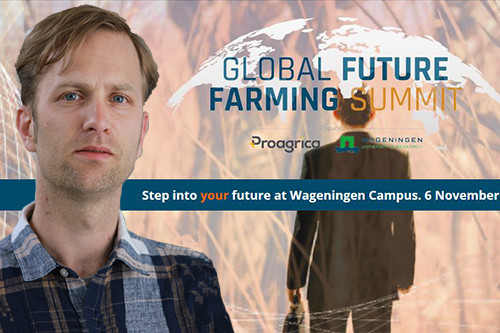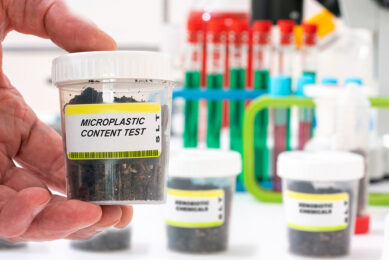“High-tech tools for more resilient plants”

High-tech phenotyping tools can measure, understand, model and predict plant growth. How this is done can be seen during the upcoming Global Future Farming Summit Experience Tour where researcher Rick van de Zedde will explain why this is so important for food security in the future.
Van de Zedde is senior scientist / business developer Phenomics and Automation at Wageningen University and Research Center (WUR) in the Netherlands. The experience tour (part of the Global Future Farming Summit in Wageningen, the Netherlands) will tour through the research facilities from WUR (Unifarm) where researchers work on robotics, phenotyping and automation to create the crops of the future.
You are working on phenotyping of plants. What does this entail?
“Phenotyping is the study of how the plant performs in relation to the genetic make-up, the conditions it is growing in and external stressors. A phenotype results from the expression of the plant’s genetic code, its genotype, as well as the influence of environmental factors and the interactions between the two. Phenotyping is a key part for plant breeders to test and evaluate new varieties. At Unifarm we have developed tools where we can do this automatically by using advanced cameras, sensors and drones. We use these tools in climate rooms, greenhouse compartments and on fields with for instance drones outside, flying over the crop fields and gathering data. Automatically measuring plant characteristics makes it possible to evaluate large number of plants. It is fast, objective and it saves time and money.”
Why is it so important to breed new plant varieties?
“The agricultural sector is experiencing the results of climate change all across the globe, from floods in Bangladesh and the US and droughts in certain parts of Africa to the arrival of new plant diseases in Europe. We need to better understand how the yield of our crops is being limited by stress and certain weather conditions. And vice versa, how new breeding lines, under the right conditions, still can lead to higher yields. But above all, we want to breed crops that are more resilient, stronger to cope with extremes. This means it is not always about aiming for higher yields. A farmer is better off with a crop that can survive after a few days under water (after a flood for example), than high yielding varieties that are in potential very promising from an economic standpoint, but drop in performance immediately when they are covered in water. At the same time, we are of course interested in boosting the crop yields overall, as this helps in feeding a growing world population. An example to achieve this is via improved photosynthesis of the plant and integrate this in new breeding varieties that use photosynthesis more efficient, hence produce more.”
So you can actually measure photosynthesis?
“Yes, we can. There are techniques available to measure photosynthetic processes in the plant. In other words, we can measure how efficient the plant can turn light energy into chemical energy, used for plant growth and development. Some plant species are simply better than others in converting UV light into direct yield. By understanding the underlying mechanisms of this, we need to gather a lot of data. We measure the photosynthesis by taking photos of the plants a couple of times a day in varying light conditions. A robot equipped with this camera collects this information automatically and also measures size and colour of all the plants. This way we can measure the photosynthesis, growth and movement of the plants day and night. This information helps us to select for varieties that for instance can better and quicker switch on the photosynthesis mechanism in varying lighting conditions (e.g. cloudy days). The quicker a plant can activate photosynthesis during daytime, the more efficient it is. And this in turn leads to higher yields. Considering that pants only use 1% of the UV light for actual plant growth, a slight improvement established here will result in big improvements overall. This has the potential to improve efficiency of crops in the field, and also for example in plants that are grown in vertical farms indoors.”
How will all these high-tech tools change the world of plant breeding?
“All the research we do and the high-tech tools we develop will benefit plant breeding, which is still a little bit of a traditional sector. We want to make this world more digital and this helps us with large scale data collection on plants so we can see patterns and use this information again to breed better varieties. At the same time, I believe that we must move more towards predictive models, instead of only looking back which yields we harvested and which varieties worked best. With the amount of data we gather and the way we link genotype with performance in the field and the way plants can deal with environmental stressors we can much better predict how the crops behave in practice, and this in turn should lead to better decisions made by the farmer to which crop he will plant where and when. In areas where salinisation levels will increase, the breeder can find out sooner which variety works best in salty soils, because the trials can be done on a massive scale assisted by high-tech phenotyping tools Farmers will than plant the most efficient and robust varieties exactly suitable for their fields. This way we create tools that are more technological and un-biased, instead of assumptions and often also a lot of manual work.”
So lots of work to do still in the future?
“Certainly. We can still improve so much in plant breeding. The use of current and new high-tech tools give us access to data that we never had before. I am therefore extremely happy that we can speed up our work with the recent grant we got from the Dutch government to open the Netherlands Plant Eco-phenotyping Centre (NPEC). The NPEC facility is an initiative of Wageningen University & Research and Utrecht University. We have been granted 22 million Euro to build this new high-tech facility, which will be an addition to the work we already do at Unifarm. At NPEC we will continue our work on high quality phenotyping.”
What can people see at the experience tour?
“In Wageningen we focus a lot on high value greenhouse crops, as we call them. These include cucumbers, tomatoes, bell peppers and we will also demonstrate developments on intercropping on field and trials on potatoes. I will explain what we do with these crops and which challenges we need to tackle (for example: making a sweeter, stronger tomato). At Unifarm, people can see how we use the so-called greenhouse phenotyping, in which we do whole-plant and testing of numerous crops, from seedling to harvest. During the tour our experts will also explain how we measure photosynthesis, which is a big theme for us, and how we use drones in our test fields in the Netherlands, Belgium and France. These test fields are divided in thousands of little squares, each planted with different crops and different varieties. The data gathered from all these squares give us valuable information on growth and performance of these crops, research carried out in public-private partnership together with high-tech industry and breeding companies I am looking forward to welcoming the international audience to our facilities in Wageningen, a unique place where technology people, who develop equipment, drones and Artificial Intelligent tools, and the biologists (who use the equipment and interpret the data coming from it) work together as one team to make the crops of the future to contribute to healthy and fresh food security worldwide.”
Join the Experience Tour and Summit! On 6-7 November 2018, leading experts in the agrifood industry come together at the campus of Wageningen University and Research Centre in the Netherlands. The programme consists of a high level summit (November 6) and an experience tour (November 7). Some of the keynote speakers at the summit include: Claudia Roessler from Microsoft and Ros Harvey, founder and Managing Director, The Yield, Australia. The experience tour will lead the attendees through a range of high tech facilities at the Wageningen Campus. Register now to secure your seat! There are limited spaces available. |











